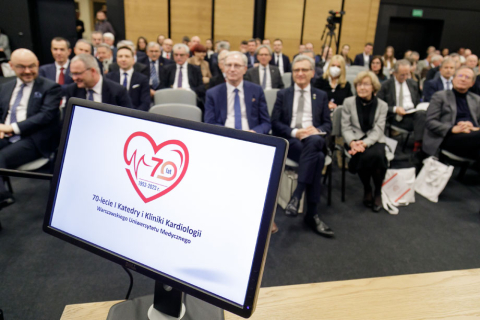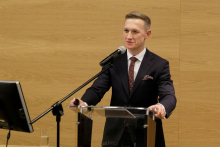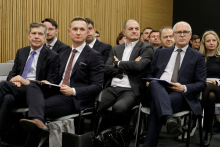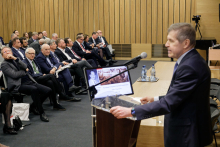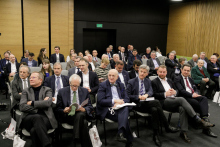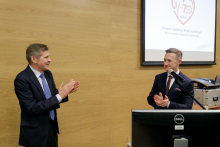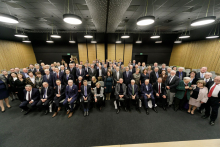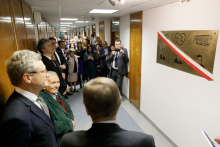As part of the 70th anniversary celebration, a festive session was held to talk about the history, present and future not only of the department, but also of Polish cardiology. It was also an opportunity to reminisce, discuss and appreciate those employees who have contributed most to its development. The ceremony was attended by guests from the Ministry of Health, representatives of the Polish Parliament and the National Health Fund, who congratulated the jubilee to the head and all the employees of the department.
It is worth recalling that the 1st Department of Cardiology MUW is a continuation of the 4th Department of Internal Medicine at the Medical Academy in Warsaw, which was established in 1953. The history of the 70 years of the department was presented by its head from 1998 to 2021, Prof. Grzegorz Opolski. He devoted particular space in his speech to the figure of Prof. Zdzisław Askanas.
- Prof. Askanas was the founder and first head of the department. His life did not lack dramatic moments, such as the heroic defense of Warsaw and his stay in the ghetto. In 1961, Prof. Askanas was appointed the first-ever national specialist in cardiology. And he immediately began building Polish cardiology from scratch - recalled Prof. Opolski.
The first step was the organization of the Central Outpatient Clinic for Cardiovascular Diseases. The next steps were the establishment of the first Intensive Cardiac Care Unit in Poland, the establishment of the Institute of Cardiology of the Medical University of Warsaw, and the start of pacemaker implantation procedures at the department. On the initiative of Prof. Zdzislaw Askanas, a "Polish model" of non-cardiac rehabilitation was also developed, accepted and later promoted by the World Health Organization. Epidemiological studies on the prevalence and incidence of coronary artery disease and hypertension were also conducted.
From Prof. Opolski's lecture emerged a picture of Prof. Askanas as a great authority, a titan of work and a visionary whose projects went far beyond his contemporaries.
After Prof. Askanas' death, Prof. Tadeusz Kraska took over the leadership. At that time, there were many organizational transformations, but the most important was the establishment of a sub-department for implanting pacemakers. The department also conducted research on reducing the area of myocardial infarction and many other projects. After Prof. Kraska retired, Prof. Opolski became the head of the department.
- In 1998, I faced two challenges: the development of invasive cardiology and the emergence of cardiac surgery, the former head of the department said. - And both of these challenges were met.
After Prof. Opolski's lecture on the history of the department, Prof. Marcin Grabowski invited us to travel to the future. However, he began his lecture by emphasizing that the team of the First Chair and Department of Cardiology are exceptional people. Not only great doctors, but also multi-talented people who achieve success in many fields and are awarded in prestigious medical competitions.
- As for current activities and the future, we are based on three main pillars. These are: scientific, teaching and treatment activities - said Prof. Grabowski. - Last year we had more than 200 original publications in impacted journals. We also maintain registries, for example, we initiated and maintain the Pol-tako registry, and we are active in the structures of the PTK. This gives us a high position in the rankings. In last year's Scientific Ranking of MUW Units, the achievements of our department's staff were ranked second among 106 units. In addition, more than a dozen people were included in the Ranking of One Hundred Scientific Leaders of MUW. So what is still worth working on? The challenge is to develop domestic and international cooperation.
Prof. Grabowski also spoke about teaching activities: - In practice, there are more than 7,000 hours of didactic salary, education of students at the bedside and with the use of simulators, and finally our driving force, that is, the activities of the student research circle, which has more than 200 members. Didactics has its challenges. Covid has taught us that we need to change our approach. We are focused on new technologies and new opportunities.
The third area of the department's activity, the most important one, is curative activity. - Annually we have more than 7,000 hospitalizations. Last year alone, our team earned more than 90 million contracts with the National Health Service. We are interested in innovation. At the moment it is new treatment options in percutaneous procedures for interventions in structural defects. The future is also robotics in cardiology - said the current head of the department.
And what is the recipe for success? - Let's do what we do well, what we love and what others need. I am convinced that our team meets all these conditions - admitted Prof. Grabowski.
During the ceremony, Prof. Zbigniew Gaciong, Rector of MUW, together with Prof. Marcin Grabowski, presented Dr. Tytus Chałubiński medals on the occasion of the 70th anniversary of the department. The honors were awarded to: Paweł Balsam, MD, PhD, Dr. Anna Budaj-Fidecka, Monika Budnik, MD, PhD, Andrzej Cacko, MD, PhD, Dr. Anna Fojt, Renata Główczyńska, MD, PhD, Prof. Zenon Huczek, Dr. Łukasz Januszkiewicz, Agnieszka Kapłon-Cieślicka, MD, PhD, Dr. Grzegorz Karpiński, Agnieszka Kołodzińska, MD, PhD, Łukasz Kołtowski, MD, PhD, Dr. Robert Kowalik, Dr. Piotr Lodziński, Michal Marchel, MD, PhD, Tomasz Mazurek, MD, PhD, Dr. Marcin Michalak, Radosław Piątkowski, MD, PhD, Dr. Arkadiusz Pietrasik, Dr. Adam Rdzanek, Dr. Marta Starczewska, Dr. Violetta Stępień- Adamczewska, Dr. Ewa Szczerba, Grażyna Szymańska, MA - ward nurse, Elżbieta Świętoń, MA - ward nurse, Mariusz Tomaniak, MD, PhD, Bożena Truszkowska, MA, Dr. Eulalia Welk, Dr. Joanna Wilczyńska-Burlikowska, Dr. Andrzej Zieliński. Photo-report from the award ceremony.
Present at the anniversary session were, among others: HMR of MUW - Prof. Zbigniew Gaciong, together with vice rectors; Maciej Miłkowski - Undersecretary of State in the Ministry of Health; MP Tomasz Latos - Chairman of the Parliamentary Health Committee; Prof. Ryszard Gellert - Director of the Center for Medical Postgraduate Education, Filip Nowak - President of the National Health Fund, Prof. Marek Krawczyk - former Rector of MUW, currently Dean of the Faculty of the V Polish Academy of Sciences, Prof. Witold Rużyłło, long-time former Director of the Institute of Cardiology, Dr. h.c. MUW, Łukasz Jankowski - president of the Supreme Chamber of Physicians, Prof. Przemysław Mitkowski - president of the Polish Society of Cardiology; Prof. Tomasz Hryniewiecki - national consultant in cardiology; Prof. Łukasz Szumowski - director of the National Institute of Cardiology; Zbigniew Terek - director of the Mazovian Regional Branch of the National Health Fund; Dr. Tomasz Imiela - vice president of the District Medical Council in Warsaw; Prof. Rafał Krenke - dean of the Faculty of Medicine MUW, as well as deans of other faculties of our University, students of Prof. Zdzisław Askanas: Dr. Katarzyna Tymińska-Sędek, Prof. Jerzy Korewicki, Prof. Jan Tylka; heads and employees of friendly cardiology clinics and departments from Poland, heads of UCC MUW departments, former and current employees of the 1st Chair and Department of Cardiology MUW.
As part of the anniversary celebrations, before the session, flowers were laid on the grave of Prof. Zdzislaw Askanas and on the graves of his students: Prof. Leszek Ceremużyński, Prof. Tadeusz Kraska and Prof. Jerzy Kuch (Photo Report). Meanwhile, after the session, a commemorative plaque dedicated to the 70th anniversary was unveiled at the First Chair and Department of Cardiology.
